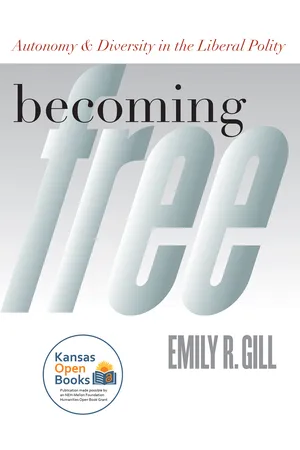Becoming Free
About this book
As ethnic, racial, religious, and gender-based groups demand rights to pursue radically diverse lifestyles or maintain their cultural traditions, conflict seems inevitable, even in a free society. Government may offer remedies to social dilemmas—such as affirmative action, curbs on immigration, or protection of gay rights—but these may only fan the flames of resentment. Yet any society that tolerates and protects diversity is more likely to preserve the freedom to live one’s life without interference.
Emily Gill reexamines the liberal tradition to reconcile its core commitments to autonomy and diversity-values that in theory are complementary but in practice are often at odds-and to show that the interaction of these values determines how we as individuals become free. In Becoming Free, she argues that true freedom is enhanced through the promotion of diversity and the encouragement of rational reflection on the options it allows—and that limited choice or ignorance diminishes such freedom. Yet an incomplete freedom is what many individuals, groups, and states advocate when they commit to particular cultural traditions or religious beliefs, despite the autonomy they themselves enjoy.
Gill traces the implications of these conflicting views by drawing on recent scholarship and legal decisions in six areas: national citizenship, cultural membership, ethnicity and gender, religious belief, sexuality, and civic education. By exploring the tensions between autonomy and diversity in such instances as Boy Scouts membership restrictions, gay rights legislation, and education among the Amish, she not only offers an insightful commentary on current issues but also explores the moral foundations of liberal thought.
Unlike those who criticize liberalism for its shallow philosophical grounding, Gill shows it to have a substantive moral content grounded in the individual’s capacity to make rational decisions based on critical reflection. In her tightly woven arguments, she explores real-world problems in a meaningful way for students and for anyone concerned with the future of liberalism, showing that becoming free is an ongoing process of human and social development.
Open access edition funded by the National Endowment for Humanities and the Andrew W. Mellon Foundation Humanities Open Book Program.
Tools to learn more effectively

Saving Books

Keyword Search

Annotating Text

Listen to it instead
Information
Table of contents
- Front Cover
- Half Title
- Title Page
- Copyright Page
- Dedication
- Contents
- Preface To Kansas Open Books Edition
- Preface
- Introduction
- 1. Neutrality, Autonomy, and Diversity
- 2. National Citizenship in the Liberal Polity
- 3. Cultural Particularism in the Liberal Polity
- 4. Ethnic and Gender Identity
- 5. Toleration and Religious Belief
- 6. Sexuality, Neutrality, and Autonomy in the Liberal Polity
- 7. Education for Citizenship
- Notes
- Index
- Back Cover
Frequently asked questions
- Essential is ideal for learners and professionals who enjoy exploring a wide range of subjects. Access the Essential Library with 800,000+ trusted titles and best-sellers across business, personal growth, and the humanities. Includes unlimited reading time and Standard Read Aloud voice.
- Complete: Perfect for advanced learners and researchers needing full, unrestricted access. Unlock 1.4M+ books across hundreds of subjects, including academic and specialized titles. The Complete Plan also includes advanced features like Premium Read Aloud and Research Assistant.
Please note we cannot support devices running on iOS 13 and Android 7 or earlier. Learn more about using the app
